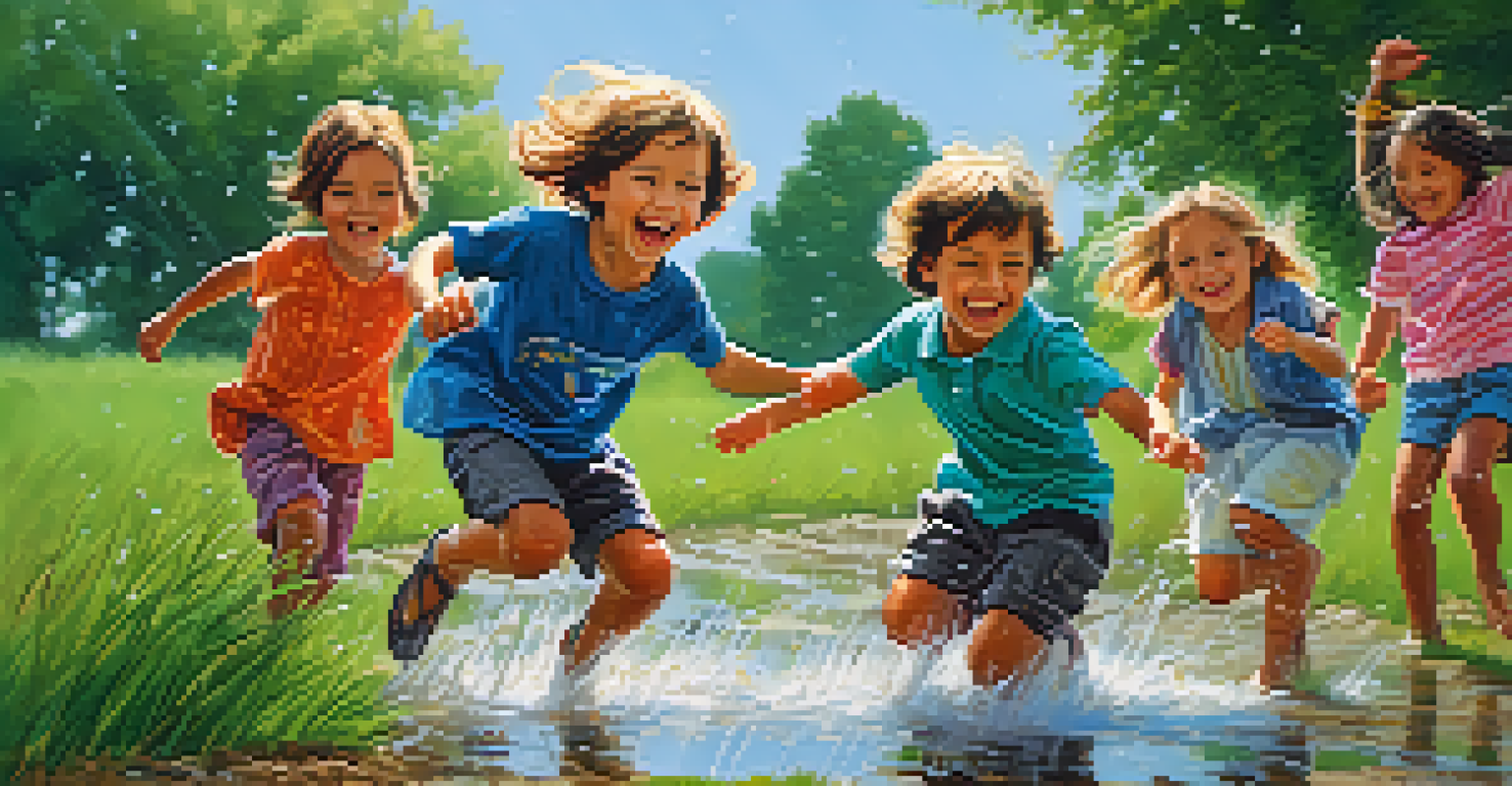The Benefits of Outdoor Learning for Young Children

Outdoor Learning: A Natural Classroom for Young Minds
Outdoor learning provides an engaging environment that sparks curiosity in young children. Nature serves as an endless classroom, where children can explore different textures, sounds, and sights that are not available indoors. This hands-on experience encourages them to ask questions and seek answers, fostering a lifelong love for learning.
The best teacher in the world is nature.
When children are outdoors, they are often more active, which is crucial for their physical development. Climbing trees, running on grass, or even jumping in puddles helps build their strength, coordination, and balance. Such activities not only promote fitness but also develop essential motor skills that are vital at this stage of their growth.
Moreover, outdoor settings can stimulate creativity and imagination. Whether it's pretending to be explorers in a forest or artists drawing the clouds, children can engage in imaginative play that enhances their cognitive abilities. This unstructured playtime encourages them to think critically and solve problems as they interact with the natural world around them.
Boosting Social Skills Through Outdoor Interaction
Outdoor learning naturally fosters social interaction among children. When kids play together outside, they learn how to cooperate, share, and communicate effectively. These interactions are vital for developing teamwork skills that will benefit them throughout their lives.

In outdoor settings, children often engage in group activities, such as games or collaborative projects, which require them to negotiate roles and responsibilities. This not only enhances their ability to work with others but also builds their confidence in expressing their thoughts and ideas. Skills learned in these environments are transferable to classroom settings and later life situations.
Outdoor Learning Sparks Curiosity
Nature serves as an engaging classroom that inspires children to explore and ask questions, fostering a love for learning.
Additionally, outdoor play often comes with challenges that require children to strategize and make decisions together. Whether it's navigating a tricky climbing structure or planning a game, these experiences teach children to resolve conflicts and understand different perspectives. Such lessons are invaluable as they shape their interpersonal skills and emotional intelligence.
Enhancing Cognitive Development with Nature's Wonders
Research shows that outdoor learning can significantly enhance cognitive development in young children. Exposure to nature has been linked to improved attention spans and better memory retention. The sights and sounds of the outdoors provide unique stimuli that engage children's senses and promote brain development.
Children learn as they play. Most importantly, in play, children learn how to learn.
Children who spend time outside are often more observant, picking up on details they might overlook in a traditional classroom. This keen observation skills nurtured through outdoor learning can lead to greater scientific inquiry and exploration. For instance, noticing the different shapes of leaves or the behavior of insects ignites a curiosity that encourages further investigation.
Moreover, outdoor learning experiences often connect directly to real-world concepts, making learning more meaningful. For example, planting seeds in a garden can teach children about the lifecycle of plants and the importance of biodiversity. These hands-on experiences create lasting impressions that deepen their understanding of essential concepts.
Emotional Benefits: Building Resilience and Confidence
Engaging in outdoor learning can significantly boost children's emotional well-being. Nature provides a calming backdrop that allows children to relax and unwind. This connection to the natural world can reduce stress and anxiety, promoting better emotional health.
Additionally, overcoming challenges in outdoor environments helps build resilience in young children. Whether it's climbing a steep hill or navigating through a muddy path, these experiences teach them that they can face and conquer obstacles. This sense of accomplishment contributes to their self-esteem and confidence.
Boosting Social Skills Outdoors
Playing outside helps children develop essential social skills such as cooperation, communication, and conflict resolution.
Furthermore, outdoor learning encourages mindfulness as children become more aware of their surroundings. This awareness fosters a deeper connection to nature and their own emotions, helping them develop coping strategies for future challenges. Such emotional intelligence is an essential life skill that will serve them well into adulthood.
Fostering a Connection with Nature for Lifelong Impact
One of the most significant benefits of outdoor learning is the connection it fosters between children and nature. As they explore the outdoors, children develop an appreciation for their environment and a sense of responsibility for its care. This connection is crucial in cultivating environmentally conscious individuals.
Experiencing nature firsthand can lead to a greater understanding of ecological concepts, such as ecosystems and conservation. When children witness the beauty of a flower or the intricacy of a spider's web, it creates a sense of wonder that encourages them to learn more about the natural world. This curiosity is essential for nurturing future environmental stewards.
Moreover, fostering this connection at a young age can impact future behaviors and attitudes towards the environment. Children who engage in outdoor learning are more likely to advocate for sustainability and take action to protect nature as they grow older. This lifelong bond with the environment can lead to a healthier planet for future generations.
Encouraging Physical Health Through Active Learning
Outdoor learning is inherently more active than traditional classroom settings, promoting overall physical health in young children. Regular physical activity is vital for a child’s growth, helping to build strong bones and muscles, and maintaining a healthy weight. Outdoor play naturally encourages movement, whether it’s running, jumping, or climbing.
Moreover, being outside exposes children to sunlight, which is essential for Vitamin D synthesis. This vitamin plays a crucial role in bone health and immune function, contributing to overall well-being. With many children spending more time indoors, outdoor learning provides a much-needed opportunity for fresh air and sunlight.
Building Emotional Resilience
Outdoor experiences promote emotional well-being by teaching children to overcome challenges and develop coping strategies.
Additionally, outdoor activities like hiking or playing sports can instill healthy habits that last a lifetime. By creating positive associations with physical activity at an early age, children are more likely to continue these habits into adulthood. This emphasis on health is crucial as we strive to combat rising levels of childhood obesity and related health issues.
Incorporating Outdoor Learning into Daily Routines
Integrating outdoor learning into daily routines can be simple and rewarding for families and educators alike. Whether it's a daily walk in the park or a weekend picnic, these activities can provide valuable learning experiences. By making nature a part of everyday life, children can reap the benefits without needing to plan elaborate outings.
Educators can also create outdoor classrooms, transforming the schoolyard or nearby parks into learning environments. Simple activities like nature scavenger hunts or outdoor storytelling sessions can enrich the educational experience while making learning fun. This approach helps children associate learning with enjoyable experiences.

Parents can further support outdoor learning by encouraging exploration during family outings. Engaging in activities like gardening, birdwatching, or even stargazing can offer unique learning opportunities. This commitment to outdoor learning fosters a love for nature and learning that children will carry with them throughout their lives.